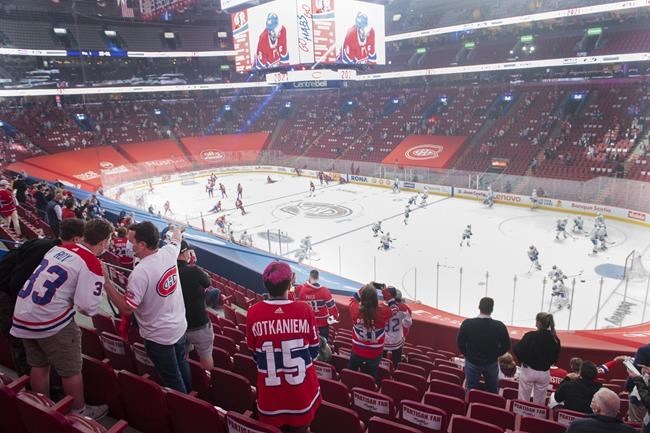MONTREAL — Quebec will increase the number of people allowed to attend sporting events and festivals to 3,500 on Thursday, one day before the Montreal Canadiens next home game.
Quebec Health Minister Christian Dubé told reporters Tuesday afternoon, before the change was announced, that COVID-19 cases are down in the province since restrictions were loosened in late May to allow 2,500 people to attend events in large venues, but the final decision would be up to public health officials.
On Sunday, Premier François Legault said he was leaning on public health director Dr. Horacio Arruda to see if anything could safely be done to get more fans in the stands when the Canadiens host the Vegas Golden Knights in Game 3 of their playoff series Friday.
While the new rules, announced by the Health Department on Tuesday evening, increase the overall capacity of venues, they maintain a cap of 250 people per section inside the arena. Each section must have separate entrances and washrooms.
Roxane Borgès Da Silva, a public health professor at the Université de Montréal, said it's in tighter spaces such as washrooms and escalators that people are most likely to spread the coronavirus.
Speaking before the capacity increase was announced, Borgès Da Silva said the capacity of the Bell Centre could be increased for people who have received two doses of vaccine, such as health-care workers. "If we accept more spectators who have been vaccinated with two doses, the risk of infection and outbreak are very low," she said in an interview Tuesday. Rapid testing at entrances could also be used to help prevent outbreaks, she added.
But she doesn't think capacity should be increased for people who have received only one dose of vaccine or none at all. That would "increase the risk of having one person who could be a carrier of a variant and who could infect the people around them," she said.
Scott Weichenthal, a professor at McGill University's department of epidemiology, biostatistics, and occupational health who studies air quality, said the novel coronavirus is known to be airborne. "If you get a whole large number of people in an arena, indoors, yelling in close proximity to each other, the chances of having transmission is obviously elevated," he said.
Legault has said Canadiens players told him they don't want to be at a disadvantage, considering Vegas has been playing in a full arena but that he wanted to be fair to other events. "There are many festivals that were planned in Quebec that were cancelled or reduced to 2,500, so I don’t want to give special rights to the Bell Centre," he said Sunday.
On Monday, Quebec extended last call at bars by an hour after calls from bar owners who said they were worried fans might have to leave before the end of late games.
Moshe Lander, a senior lecturer of economics at Concordia University in Montreal, said that allowing more fans would help the team recoup some of the financial losses of the regular season, when the stands were empty. Lander, who specializes in sports economics, said National Hockey League teams are more dependent on ticket revenue than teams in other major North American sports leagues.
"The fact is that most hockey teams have no chance of profitability without fans in the stands," he said in an interview Tuesday before the increased capacity was announced.
Fans can help the home team, Lander said, adding that the lack of a home-crowd advantage has been visible in the NBA and NHL this year. In part, he said, it's because when referees have to make a split-second decision, they sometimes err on the side of avoiding the boos and obscenities shouted at them by thousands of fans.
While it may be good for the Canadiens, Lander isn't sure allowing more fans sends the right message.
"When politicians start carving out exemptions and exceptions: bar closing times, allowing public gatherings in a way that they otherwise wouldn't, this is a little bit of a problem," he said. "Because, if you're not a sports fan, or if you're not even a Montreal Canadiens fan, then you think: 'Wait a second, what about the things that I care about?'"
When people have been forced to give up going to the sorts of events they like in the name of public health and safety, seeing a sports team get special treatment "can leave a really bad taste in people's mouths," he said.
This report by The Canadian Press was first published June 15, 2021.
———
This story was produced with the financial assistance of the Facebook and Canadian Press News Fellowship.
Jacob Serebrin, The Canadian Press



